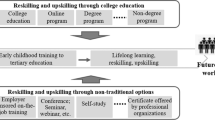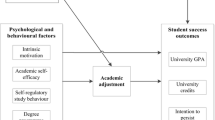Abstract
This study examines the perceived employability of facultative domestic and international business internships, using an experimental between-subject factorial design. A sample of 194 Portuguese business employees rated the employability of six fictitious résumés of business graduates varying in gender and participation in a facultative internship. The résumés were target to an entry-level marketing position and were rated on a set of employability outcomes, such as job suitability, employability skills and starting salary. The results showed that the non-participation condition resulted in the worst rates of job suitability and employability skills, while the outcomes of the international and the domestic conditions were not significantly different from each other. Male interns were the most well ranked in job suitability and starting salary, while female non-interns were the worst ranked. This study provides evidence that an internship experience, even if facultative, is an information ‘good to add’ in the résumé but does not support the prediction that ‘the more international the better’. This evidence suggests that graduates’ employability depends not only on the academic credentials and skills they can bring to the labour market as on the expectations about their unique contribution. This study is one of the first to empirically examine the perceived employability of facultative business internships, exploring the relevance and value of domestic and international experiences.

Similar content being viewed by others
References
AIESEC. (2017). Youth Global Employability Report. Retrieved September 12, 2018, from http://status.aiesec.org/files/YGER_Report.pdf.
Albers-Miller, N. D., Sigerstad, T. D., & Straughan, R. D. (1999). Internationalization of the undergraduate curriculum. Journal of Teaching in International Business, 11(4), 55–80.
Andrews, J., & Higson, H. (2008). Graduate employability, ‘soft skills’ versus ‘hard’ business knowledge: a European study. Higher Education in Europe, 33(4), 411–422.
Bailly, F. (2008). The role of employers’ beliefs in the evaluation of educational output. The Journal of Socio-Economics, 37(3), 959–968.
Brown, B. K., & Campion, M. A. (1994). Biodata phenomenology: recruiters’ perceptions and use of biographical information in resume screening. Journal of Applied Psychology, 79(6), 897.
Brown, P., Hesketh, A., & Wiliams, S. (2003). Employability in a knowledge-driven economy. Journal of Education and Work, 16(2), 107–126.
Byrne, D. (1997). An overview (and underview) of research and theory within the attraction paradigm. Journal of Social and Personal Relationships, 14(3), 417–431.
Cho, J., & Morris, M. W. (2015). Cultural study and problem-solving gains: effects of study abroad, openness, and choice. Journal of Organizational Behavior, 36(7), 944–966.
Cole, M. S., Rubin, R. S., Feild, H. S., & Giles, W. F. (2007). Recruiters’ perceptions and use of applicant résumé information: screening the recent graduate. Applied Psychology, 56(2), 319–343.
Crossman, J. E., & Clarke, M. (2010). International experience and graduate employability: stakeholder perceptions on the connection. Higher Education, 59(5), 599–613.
Eisinga, R., Grotenhuis, M. T., & Pelzer, B. (2013). The reliability of a two-item scale: Pearson, Cronbach, or Spearman-Brown? International Journal of Public Health, 58(4), 637–642.
Ellemers, N. (2018). Gender stereotypes. Annual Review of Psychology, 69(1), 275–298.
Ellsworth, P. C. (1990). Methods of research in social psychology (2nd ed.). New York: McGraw-Hill.
EUROSTAT. (2018). Gender pay gap statistics. Retrieved September 12, 2018, from: http://ec.europa.eu/eurostat/statisticsexplained/.
Evers, F. T., & Rush, J. C. (1996). The bases of competence: skill development during the transition from university to work. Management Learning, 27, 275–299.
Evers, F. T., Rush, J. C., & Berdrow, I. (1998). The bases of competence: skills for lifelong learning and employability. San Francisco: Jossey-Bass.
Gates, L. (2014). The impact of international internships and short-term immersion programs. New Directions for Student Services, 2014(146), 33–40.
Gault, J., Redington, J., & Schlager, T. (2000). Undergraduate business internships and career success: are they related? Journal of Marketing Education, 22(1), 45–53.
Gault, J., Leach, E., & Duey, M. (2010). Effects of business internships on job marketability: the employers' perspective. Education+ Training, 52(1), 76–88.
Hillage, J., & Pollard, E. (1998). Employability: developing a framework for policy analysis. Retrieved September 12, 2018, from Department for Education and Employment, http://www.employment-studies.co.uk/resource/employability-developing-framework-policy-analysis.
Hills, J. M., Robertson, G., Walker, R., Adey, M. A., & Nixon, I. (2003). Bridging the gap between degree programme curricula and employability through implementation of work-related learning. Teaching in Higher Education, 8(2), 211–231.
Holden, R., & Jameson, S. (2002). Employing graduates in SMEs: towards a research agenda. Journal of Small Business and Enterprise Development, 9(3), 271–284.
Howell, D. C. (2007). Statistical methods for Psychology. Belmont: Thompson Wadsworth.
Imose, R., & Barber, L. K. (2015). Using undergraduate grade point average as a selection tool: a synthesis of the literature. The Psychologist-Manager Journal, 18(1), 1–11.
Knight, P. T., & Yorke, M. (2004). Learning, curriculum and employability in higher education. London: Psychology Press.
Knouse, S. B. (1994). Impressions of the resume: the effects of applicant education, experience, and impression management. Journal of Business and Psychology, 9(1), 33–45.
Knouse, S. B., & Fontenot, G. (2008). Benefits of the business college internship: a research review. Journal of Employment Counselling, 45(2), 61–66.
Law, B., & Watts, A. G. (1977). Schools, careers and community. London: Church Information Office.
Maertz, C. P., Jr., Stoeberl, P. A., & Marks, J. (2014). Building successful internships: lessons from the research for interns, schools, and employers. Career Development International, 19(1), 123–142.
McElroy, J. C., Summers, J. K., & Moore, K. (2014). The effect of facial piercing on perceptions of job applicants. Organizational Behavior and Human Decision Processes, 125(1), 26–38.
McQuaid, R. W., & Lindsay, C. (2005). The concept of employability. Urban Studies, 42(2), 197–219.
Miller, K. K., & Gonzalez, A. M. (2016). Short-term international internship experiences for future teachers and other child development professionals. Issues in Educational Research, 26(2), 241–259.
Nunley, J. M., Pugh, A., Romero, N., & Seals, R. A., Jr. (2016). College major, internship experience, and employment opportunities: estimates from a résumé audit. Labour Economics, 38, 37–46.
OECD (2013a). How difficult is it to move from school to work? Paris: OECD Publishing. Retrieved from https://doi.org/10.1787/5k44zcplv70q-en.
OECD (2013b). How is international student mobility shaping up? Paris: OECD Publishing. Retrieved from https://doi.org/10.1787/5k43k8r4k821-en.
OECD (2016a). Who are the bachelor's and master's graduates? Education indicators in focus. OECD Publishing, Paris. Retrieved from https://doi.org/10.1787/5jm5hl10rbtj-en.
OECD (2016b). OECD employment outlook 2016. Paris: OECD Publishing. Retrieved from https://doi.org/10.1787/empl_outlook-2016-en.
Pegors, T. K., Mattar, M. G., Bryan, P. B., & Epstein, R. A. (2015). Simultaneous perceptual and response biases on sequential face attractiveness judgments. Journal of Experimental Psychology: General, 144(3), 664–673.
Pinto, L. H., & Ramalheira, D. C. (2017). Perceived employability of business graduates: the effect of academic performance and extracurricular activities. Journal of Vocational Behavior, 99, 165–178. https://doi.org/10.1016/j.jvb.2017.01.005.
Pires, R., Pereira, C., Azevedo, J., Espírito-Santo, I., & Vidigal, I. (2016). Portuguese emigration factbook 2015. Retrieved September 12, 2018, from http://hdl.handle.net/10071/11041.
Pool, L. D., & Sewell, P. (2007). The key to employability: developing a practical model of graduate employability. Education +Training, 49(4), 277–289.
Raybould, J., & Sheedy, V. (2005). Are graduates equipped with the right skills in the employability stakes? Industrial and Commercial Training, 37(5), 259–263.
Richardson, J. T. E. (2011). Eta squared and partial eta squared as measures of effect size in educational research. Educational Research Review, 6(2), 135–147.
Rocha, M. (2014). Predictors of the acquisition and portability of transferable skills: a longitudinal Portuguese case study on education. Higher Education, 69(4), 607–624.
Ruhanen, L., Robinson, R., & Breakey, N. (2013). A foreign assignment: internships and international students. Journal of Hospitality and Tourism Management, 20, 1–4.
Schlee, R. P., & Harich, K. R. (2010). Knowledge and skill requirements for marketing jobs in the 21st century. Journal of Marketing Education, 32(3), 341–352.
Schultz, T. W. (1961). Investment in human capital. The American Economic Review, 51(1), 1–17.
Schworm, S. K., Cadin, L., Carbone, V., Festing, M., Leon, E., & Muratbekova-Touron, M. (2017). The impact of international business education on career success—evidence from Europe. European Management Journal, 35(4), 493–504.
Silva, P., Lopes, B., Costa, M., Seabra, D., Melo, A. I., Brito, E., & Dias, G. P. (2016). Stairway to employment? Internships in higher education. Higher Education, 72(6), 703–721.
Silva, P., Lopes, B., Costa, M., Melo, A. I., Dias, G. P., Brito, E., & Seabra, D. (2018). The million-dollar question: can internships boost employment? Studies in Higher Education, 43(1), 2–21.
Stiglitz, J. (1975). The theory of “screening,” education, and the distribution of income. The American Economic Review, 65(3), 283–300.
Thoms, P., McMasters, R., Roberts, M. R., & Dombkowski, D. A. (1999). Resume characteristics as predictors of an invitation to interview. Journal of Business and Psychology, 13(3), 339–356.
Tomlinson, M. (2008). The degree is not enough: students’ perceptions of the role of higher education credentials for graduate work and employability. British Journal of Sociology of Education, 29(1), 49–61.
Toncar, M. F., & Cudmore, B. V. (2000). The overseas internship experiences. Journal of Marketing Education, 22(1), 54–63.
Tsai, W. C., Chi, N. W., Huang, T. C., & Hsu, A. J. (2011). The effects of applicant résumé contents on recruiters’ hiring recommendations: the mediating roles of recruiter fit perceptions. Applied Psychology, 60(2), 231–254.
Tymon, A. (2013). The student perspective on employability. Studies in Higher Education, 38(6), 841–856.
Vanhercke, D., Cuyper, N. D., Peeters, E., & Witte, H. D. (2014). Defining perceived employability: a psychological approach. Personnel Review, 43(4), 592–605.
Vélez, G. S., & Giner, G. R. (2015). Effects of business internships on students, employers, and higher education institutions: a systematic review. Journal of Employment Counseling, 52(3), 121–130.
Wilton, N. (2012). The impact of work placements on skills development and career outcomes for business and management graduates. Studies in Higher Education, 37(5), 603–620.
Author information
Authors and Affiliations
Corresponding author
Electronic supplementary material
ESM 1
(DOCX 40 kb)
Rights and permissions
About this article
Cite this article
Pinto, L.H., Pereira, P.C. ‘I wish to do an internship (abroad)’: investigating the perceived employability of domestic and international business internships. High Educ 78, 443–461 (2019). https://doi.org/10.1007/s10734-018-0351-1
Published:
Issue Date:
DOI: https://doi.org/10.1007/s10734-018-0351-1




